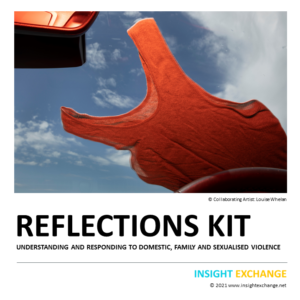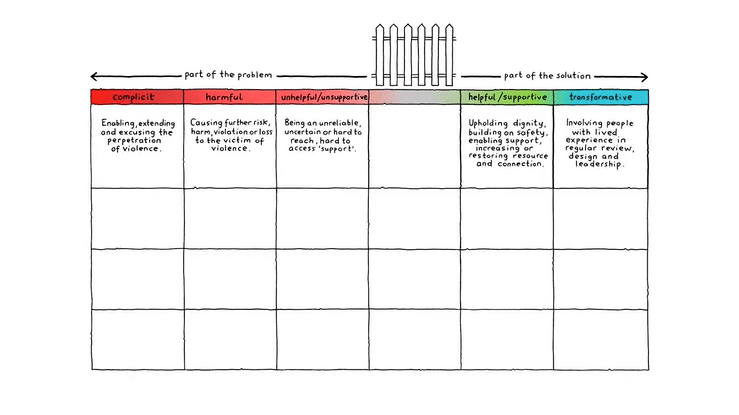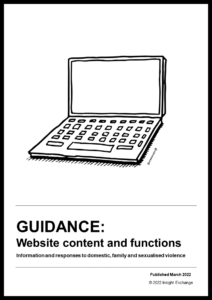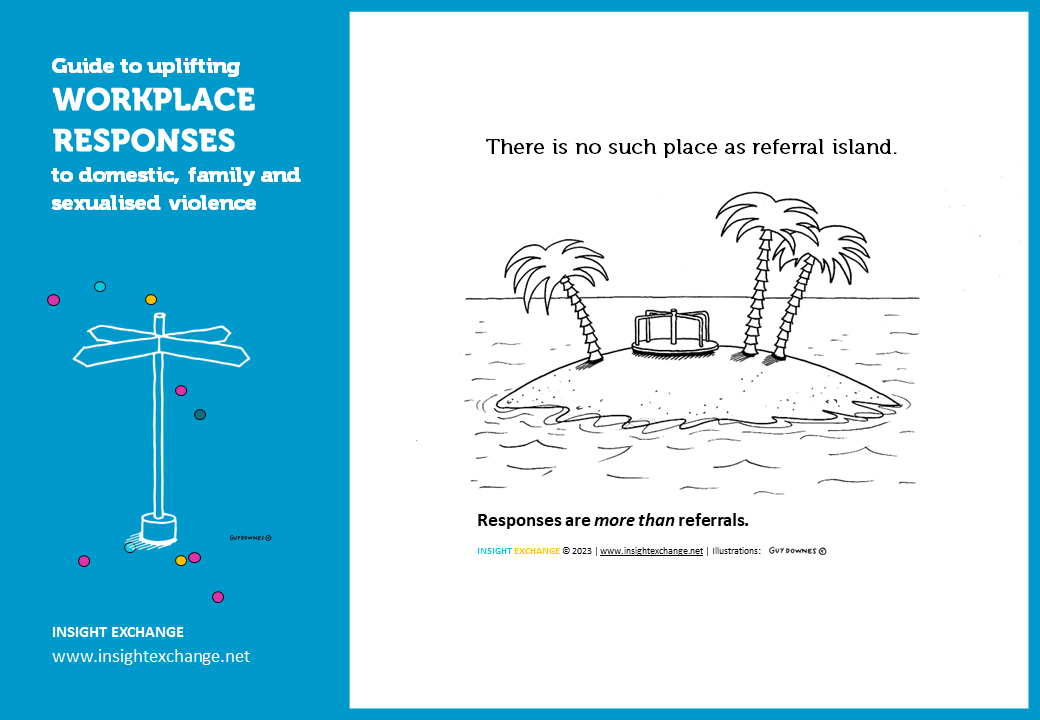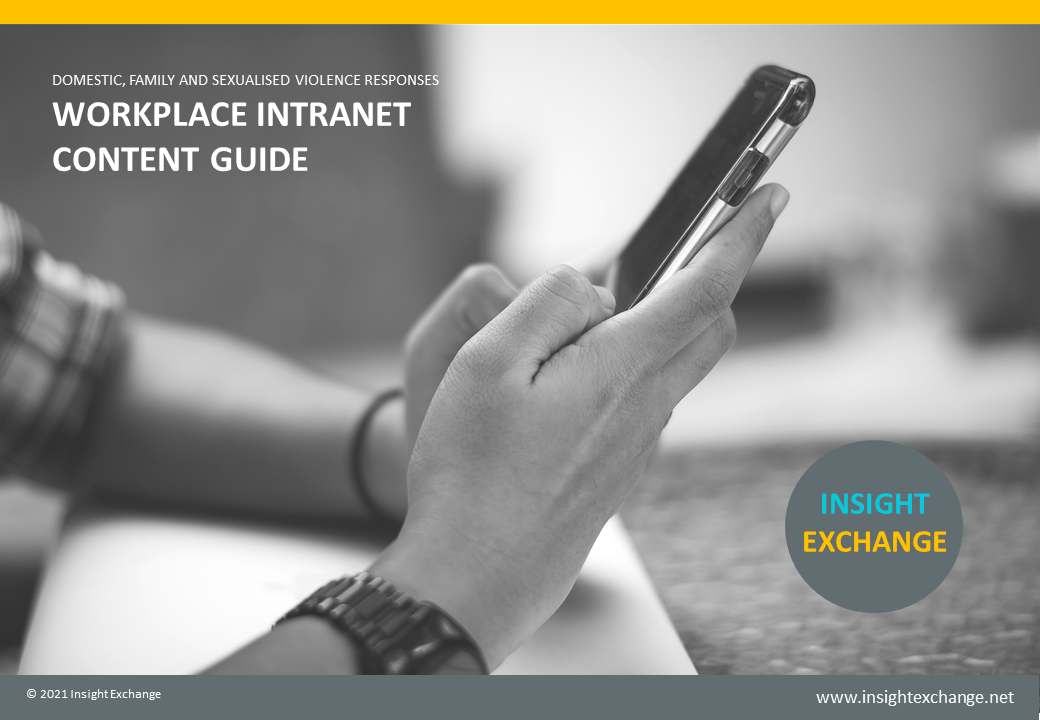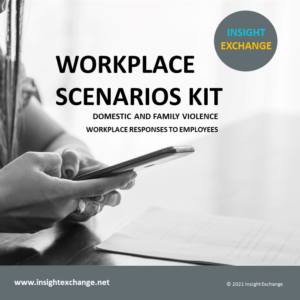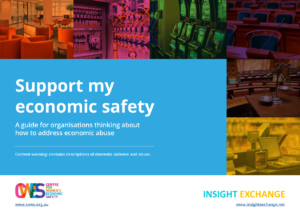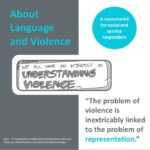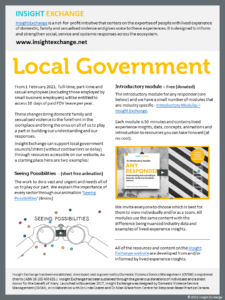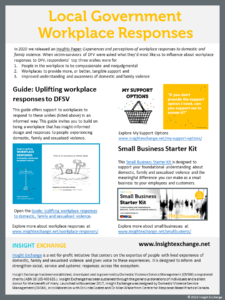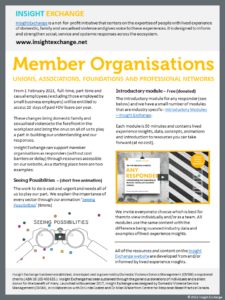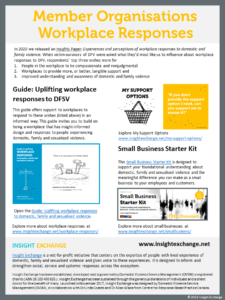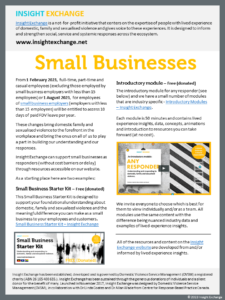Kits, Guides & Tools
What we understand about domestic, family and sexualised violence informs how we respond; it influences how we design products, services and systems. It influences how we communicate about those products, services and systems.
When a person experiencing domestic, family and sexualised violence reaches out it may be the first, only or last time they seek support.
Insight Exchange materials are free (donated) to support all responding individuals and organisations. Read the guidance on using Insight Exchange. Thankyou for your commitment to preserve the integrity of this work.
This Reflections Kit is designed to support individuals, teams, leaders and organisations who are engaging with Insight Exchange to inform their responses to domestic, family and sexualised violence.
What do we need to be thinking about when it comes to the quality of our responses to domestic, family and sexualised violence?
The quality response continuum is an Insight Exchange tool designed to support critical reflection about the quality of our responses.
This guidance is for industry employees responsible for designing, developing and delivering communications relating to DFSV, with a particular focus on digital platforms (websites).
Explore our Guide: Uplifting workplace responses to domestic, family and sexualised violence. The guide has been developed in response to our Insights Paper: Experiences and perceptions of workplace responses to domestic and family violence.
The Workplace Intranet Content Guide is designed to support organisations in their intranet communication about workplace responses to domestic, family and sexualised violence. The guide is not exhaustive or conclusive. It is designed to support reflection and review of what your organisation has in place already, how that might need to be adapted, and what might be missing.
The Workplace Scenarios Kit is designed to provide practical support to organisations as they assess their existing and potential responses to experiences of domestic and family violence. It complements the Futures Framework and other Insight Exchange materials designed to inform and support responders.
Support My Economic Safety provides guidance and reflections for people in organisations and systems who want to improve responses to economic abuse. It has been developed from the insights of women who have experienced economic abuse in the context of domestic and family violence and includes their words as ‘case studies’ throughout. Lived experiences of economic abuse have significant and ongoing consequences, negatively impacting all domains of wellbeing.
"The problem of violence is inextricably linked to the problem of representation." | Dr Linda Coates & Dr Allan Wade [1] Explore the second edition of the Language and Violence Resource Kit.
The Language Lab provides information on the role of language in representing violence and abuse, and tools to help us use language to more accurately represent violence and other adversities. It recognises that language can be used in restrictive or liberating ways to:
- conceal or reveal violence
- obscure or reveal offender responsibility
- conceal or reveal responses and resistance; and
- blame or contest the blaming of, victims.
[1] Dr Linda Coates and Dr Allan Wade (2007), 'Language and Violence: Analysis of Four Discursive Operations', Journal of Family Violence, 22:511-522.
The scenarios are developed by (i) organisations engaging with Insight Exchange and the ideas of response-based practice, or (ii) organisations (local and international) who are also working to understand, apply and share practices informed by response-based practice. We invite you to draw from these examples to inform and evolve your good work.
- 5 scenarios (in PDF format only) are hosted inside the Practice Exchange 2019 Portfolio. Each service scenario is hypothetical and includes Scenario A and B as well as observations by Dr Allan Wade (Centre for Response-Based Practice).
- Pedagogical Theatre (Sweden) – 3 scenarios (in video format) and supporting guide. 3 scenarios have been produced and are hosted on You Tube, each with version 1 and version 2 comparatively showing what response-based practice can look like when applied. The scenarios (below) can be played with English subtitles. The supporting guide is in English and provides context and reflection questions about the scenarios. We invite you to use these resources which are hosted on https://www.samverkanmotvald.se/una-norrbotten/responsed-based-practise/. The films and support material have been produced with the support of the County Administrative Board of Norrbotten and the Swedish Gender Equality Agency.
Short Guides
Local Government and Local Councils are a connection point for many individuals, businesses and services within communities across Australia. Local government and local councils have a significant role to play in responding to domestic, family and sexualised violence.
Open Local Government guides
Member organisations such as unions, associations, foundations and professional networks are a connection point for many individuals and businesses across Australia.
Member organisations have a significant role to play in responding to domestic, family and sexualised violence, not simply in their influence and advocacy but also in their direct responses to individual members.
Open Member Organisation guides
Small businesses throughout Australia face many challenges. We have developed a free (donated) Small Business - Starter Kit designed to support your foundational understanding about domestic, family and sexualised violence and the meaningful difference you can make as a small business to your employees and customers. The kit (PDF) contains links to the animations and resources listed.
Open other supporting resources
Archive
Archived Short Guides
Responding to domestic and family violence during and beyond COVID-19:
We have developed a series of guides to support the responses of individuals and sectors to people experiencing domestic and family violence during and beyond COVID-19.
Each guide takes a focus on considerations for now, and next, to be ready to support people experiencing domestic and family violence.
Supporting people during and beyond COVID-19 is our shared responsibility and no sector can create safety alone.
- A guide for family and friends
- A guide for workplaces
- A guide for responding to customers
- A guide for faith communities
- A guide for responding to tertiary students
Guides for other sectors? Is your sector needing a similar guide sooner than later? Contact Us and we can prioritise to support your needs.
Archived publications and resources
- Language and Violence Tool for People with Lived experience of Violence
- Language and Violence - Checking My Practice tool for responders.
- Foundations Guide - core tenets of response-based practice and related ideas on Insight Exchange.
- Contextual Analysis Mapping the Response-Based Contextual Analysis - Centre for Response Based Practice
- Responses in Context Violence does not take place in a vacuum. It is not merely individual or psychological. Violence occurs socially and interactionally.
- Core tenets of response-based practice and Interviewing for Social Responses Actual and possible social responses are a constant concern for victims and offenders in cases of interpersonal violence, including children.
Archived initiatives
- Practice Exchange Portfolio 2019 Practice Exchange– provides participating organisations a supported opportunity to review and develop their practice in responding to Domestic and Family Violence and related forms of adversity.
- Who benefits from keeping us apart? In 2020-2021 we engaged with a small group of Insight Exchange Associates and Collaborators from a range of contexts. Reflections from the initiative are shared in ‘Who benefits from keeping us apart?’ A collection of reflections from Insight Exchange Associates FY20/21.
- Future Leaders - Today's tertiary students will become tomorrow’s leaders. Read below about the Future Leaders Insight Exchange Program. This program has been donated by Insight Exchange and has no cost barriers.

